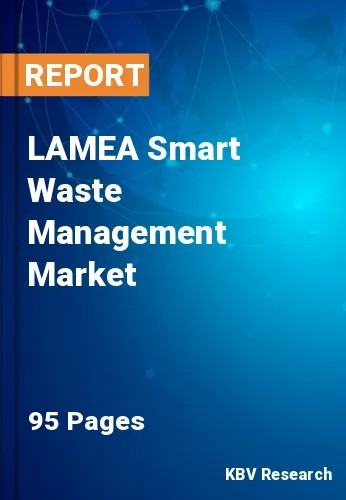The Latin America, Middle East and Africa Smart Waste Management Market would witness market growth of 18.0% CAGR during the forecast period (2024-2031).
The Brazil market dominated the LAMEA Smart Waste Management Market by Country in 2023, and would continue to be a dominant market till 2031; thereby, achieving a market value of $130.4 million by 2031. The Argentina market is showcasing a CAGR of 19.2% during (2024 - 2031). Additionally, The UAE market would register a CAGR of 17.6% during (2024 - 2031).

Government policies and regulations are also pivotal in driving the adoption of smart waste management technologies. The regulatory frameworks incentivize municipalities and businesses to invest in smart waste management solutions to comply with environmental standards and achieve sustainability goals.
Moreover, the waste management systems' predictive maintenance capabilities contribute to cost efficiency. These systems can monitor the condition of waste collection vehicles and equipment, predicting when maintenance is needed before a breakdown occurs. This proactive approach reduces unexpected repair costs and extends the lifespan of the equipment, further lowering operational expenses.
The UAE government has implemented several initiatives to promote sustainability and environmental protection, aligning with the country’s Vision 2021 and Green Growth Strategy. The UAE generates approximately 8 million tons of municipal waste annually, according to the UAE Ministry of Climate Change and Environment (MOCCAE). The per capita municipal solid waste generation of the country peaked at approximately 2.1 kg/day before gradually decreasing to approximately 1.8 kg/day, which is among the highest in the world.
Dubai has pioneered smart waste management, utilizing IoT-enabled sensors, GPS tracking, and data analytics to enhance waste collection and processing. The city has implemented smart bins and automated waste collection systems to optimize routes and improve efficiency. In South Africa, regulatory frameworks and environmental concerns drive the increasing demand for waste management solutions. Through the Department of Environment, Forestry, and Fisheries (DEFF), the South African government has introduced policies to promote waste reduction, recycling, and sustainable waste management. The National Waste Management Strategy (NWMS) outlines goals for reducing landfill use and increasing recycling rates. Thus, in this region, government initiatives, public-private partnerships, and investments in advanced technologies will drive the market's growth throughout the forecast period.
Free Valuable Insights: The Worldwide Smart Waste Management Market is Projected to reach USD 6.5 Billion by 2031, at a CAGR of 15.3%
Based on Source, the market is segmented into Residential, Industrial, and Commercial. Based on Method, the market is segmented into Smart Collection, Smart Processing and Smart Disposal. Based on Waste Type, the market is segmented into Solid Waste, E-Waste, and Special Waste. Based on countries, the market is segmented into Brazil, Argentina, UAE, Saudi Arabia, South Africa, Nigeria, and Rest of LAMEA.
By Source
By Method
By Waste Type
By Country
Our team of dedicated experts can provide you with attractive expansion opportunities for your business.

